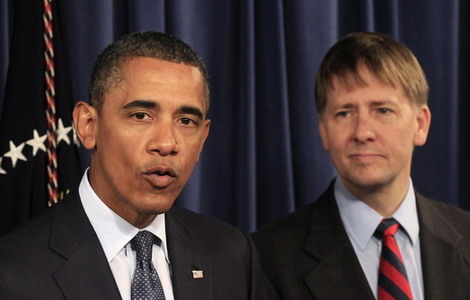Pop the bubbles for real investment: Wen
Updated: 2012-01-08 07:42
By Chen Jia (China Daily)
|
|||||||||
China should set up a long-term mechanism that will make sure the "real economy" gets sufficient investment for growth, to strengthen the foundation for economic growth in the post-crisis era, the premier said. He was speaking at the end of the two-day National Financial Work Conference on Saturday in Beijing.
"In future, China will stick to the principle of having the financial industry serve the real economy to prevent virtual bubbles from inflating the economy," Wen said.
The real economy is defined as production activity in sectors such as agriculture, manufacturing and service, which is the basis of a country's GDP.
China's financial system is running on a stable course despite the global financial crisis, he said. However, apparent problems and potential risks still linger and the crisis is not over, Wen said.
"China's economy has maintained stable and relatively fast growth with stabilized consumer prices and improvement in people's lives. The financial system is running steadily. The positive momentum of economic and social development remains unchanged.
"We have the confidence, capability and conditions to move economic development to a new stage," he said.
The conference mapped out the blueprint for financial reform in the next five-year period. Similar conferences were held in 1997, 2002 and 2007 which led to significant policy changes, including the reform of large commercial banks that increased their capabilities of guarding against risks.
China has resolutely pushed forward a series of financial reforms which have set significant milestones. Large commercial banks improved their risk management capabilities remarkably, Wen said.
"We should note especially that the global financial crisis has not ended. We should strengthen our awareness of risks and responsibilities in order to push financial capabilities to new levels."
Wen voiced his support for the development of financial innovation, but stressed that this should not escape supervision.
"Risk-aversion should be the lifeline of our financial work," he said.
He pledged to allow market forces a greater say in deciding fund allocation and to more clearly define the government's role.
Financial supervision will be tightened and improved, and banks should establish a more complete and prudent system.
According to the conference plan, the government is expected, within the next five years, to diversify the shareholding structure of listed companies and to broaden capital sources by allowing in more private capital.
"We should protect the investors' rights and interests and break the monopoly in the financial industry," Wen said.
The premier also said the financial market should open up to overseas market faster, while strengthening its capacity to guard against external risks.
"China will steadily promote the convertibility of the RMB capital account, and further improve the management of the foreign exchange reserve," he said.
A statement from the financial conference said the banking capital adequacy ratio increased to 12.3 percent by the end of September 2011 from 7.3 percent at the end of 2006.
The bad-loan ratio was 0.9 percent, having dropped by 6.2 percentage points from 2006.
The statement also showed that by the end of November 2011, China's total assets in the financial industry had reached 119 trillion yuan ($18.8 trillion), rising 149 percent from figures at the end of 2006.
The most important task for China in the coming year is to restructure economic development and support the growth of the real economy, said Li Daokui, of the monetary policy committee of the People's Bank of China.
"We should be aware of the potential financial risks and improve the efficiency of bank lending to promote industrial upgrading," Li said.
Cheng Siwei, former vice-chairman of the Standing Committee of the National People's Congress, said on Saturday at an economic forum in Beijing that more measures should be taken to facilitate market-oriented financial reforms and enhance regulations.
"To highlight the transparency of information is necessary for financial institutions, which will encourage the whole society to supervise their activities and reduce financial crime," Cheng said.
Xinhua contributed to this story.
Hot Topics
Kim Jong-il, Mengniu, train crash probe, Vaclav Havel, New Year, coast guard death, Internet security, Mekong River, Strait of Hormuz, economic work conference
Editor's Picks

|

|

|

|

|

|







